Welcome
....to JusticeGhana Group

JusticeGhana is a Non-Governmental [and-not-for- profit] Organization (NGO) with a strong belief in Justice, Security and Progress....” More Details
There shall be no wrong doing under our watch: WHO on ebola trial in Ghana
- Details
- Category: DateLines
- Created on Wednesday, 10 June 2015 00:00
- Hits: 4852
 There shall be no wrong doing under our watch: WHO on ebola trial in Ghana
There shall be no wrong doing under our watch: WHO on ebola trial in Ghana
The World Health Organisation says it will not preside over any wrong doing in the much talked about ebola vaccine trials set to be undertaken in Ghana.
The WHO representative in Ghana Dr Magdal Robalo said ethics, safety of the volunteers remain paramount criteria despite the sense of urgency for the trial to be conducted.
"There shall be no wrong doing under our watch," Robalo assured.
The announcement for the trial in Ghana has been met with a barrage of criticisms across the country. MPs have led the charge and unanimously demanded the suspension of the trial pending comprehensive public education.
At a forum to begin the public education the scientists who were to undertake the vaccine trial warned Ghana still faces threats of a possible outbreak of the disease.
They said the spread of the disease on the continent is not over, and the trials would help position Ghana to effectively contain a possible outbreak.
The team has hinted it is still interested in going ahead with the trials despite public objection and government suspension.
They have however reduced the number of volunteers from 36 to 12.
Joy News' Joseph Opoku Gakpo who was present at the forum said participants were concerned about the likely spread of the virus if the vaccines were to be introduced into the country. The scientists were quick to dismiss that assertion.
The participants were also curious about the choice of Ghana for the vaccine trial. They thought that countries which were struck by the virus ought to have been used for the trial and not Ghana.
But organisers of the forum explained that such vaccine trials are best undertaken in countries without the virus and on people who have not contracted the virus. That way, the potency of vaccine could be ascertained.
The participants were also not impressed with the 200 Ghana, one mobile phone incentive for volunteers of the trial.
Prof Fred Binka who is the vice chancellor of the university of Health and Allied Sciences explained that Ho was chosen for the trial because there is a centre at Ho where a number of vaccination trials had been taken and they thought it was prudent to use the same centre for these trials.
Source: Myjoyonline
Cameroonian family pleads for aid for Siamese twins
- Details
- Category: Current Issues
- Created on Thursday, 07 May 2015 00:00
- Hits: 6721
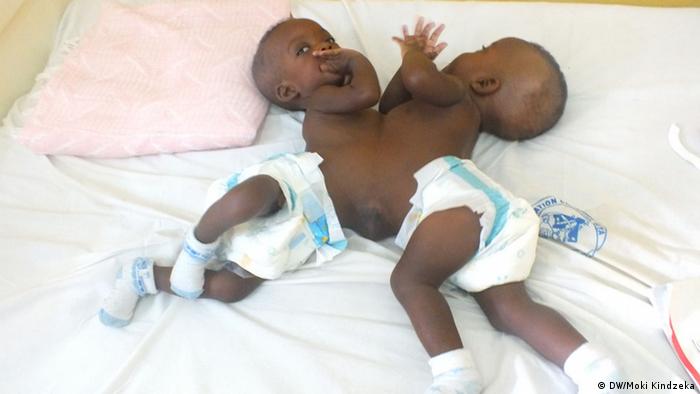 Cameroonian family pleads for aid for Siamese twins
Cameroonian family pleads for aid for Siamese twins
A family in Cameroon is asking for assistance to transfer their conjoined twins to the US for specialized surgery. So-called Siamese twins are considered evil in rural Cameroon and some of them end up being killed.
38-year-old Julius Banla Ndi plays with his conjoined twins inside a special room at the Chantal Biya Foundation in Cameroon's capital Yaounde. The twins, named Davis and Darrel, who are joined at the stomach, cheerfully play with their father as they face each other.
Julius said he had been anxiously expecting the birth of his twins. He however, had no clue that their arrival would bring such a heavy burden along. "I feel as if it is the end of the world for me," Julius told DW in an interview. "When I see them, I cry and say "God what is this. Why is this happening to me?"
Two months before the children were born, Julius lost his job as a photographer. This makes it even harder for him to support his wife Evelyn, who became paralyzed as a result of the cesarean operation. Their home is located in Ndonga Mantung in north western Cameroon, some 500 kilometers (310 miles) from Yaounde.
Conjoined twins are traditionally accused of witchcraft and some have been killed in parts of north western Cameroon. But Julius said he believes his sons are a gift from God.
From the village to Yaounde
Together, the Siamese twins now weigh 6 kilograms (13 pounds). They were brought to the Chantal Biya Foundation by Ruth Ali Enow. She works for the nongovernmental organization Youth and Gender Welfare Association.
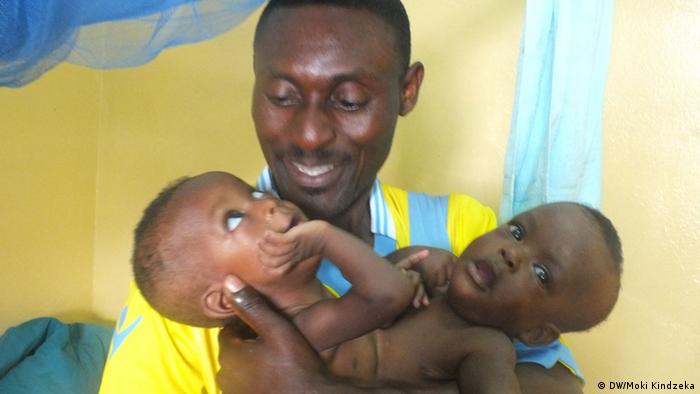
Enow said the hospital in the family's home area was overwhelmed with the birth of the Siamese twins. So she convinced the parents to have them transferred to Yaounde. "Strangely, their hearts, their kidneys and their livers are not on the side they are supposed to be," Enow said. "One of them has his testicles around the abdomen," she said.
Medical scans have revealed that some of their organs like the intestines are interwoven. Some minor but not vital organs are also joined and working together. Because of that, the babies have to be put on a special diet to prevent either of them developing extreme temperatures. "If one of them falls sick, the other will be affected," Enow said.
Seeking help
Julius spends every day hoping that someone will help them raise $15,000 (13,000 euros), to fly the twins to the United States where they can undergo specialized surgery to separate them.
Doctor Koki Ndomba Paul who has been attending to the boys told DW, Cameroon does not have the facilities to undertake such a delicate operation.
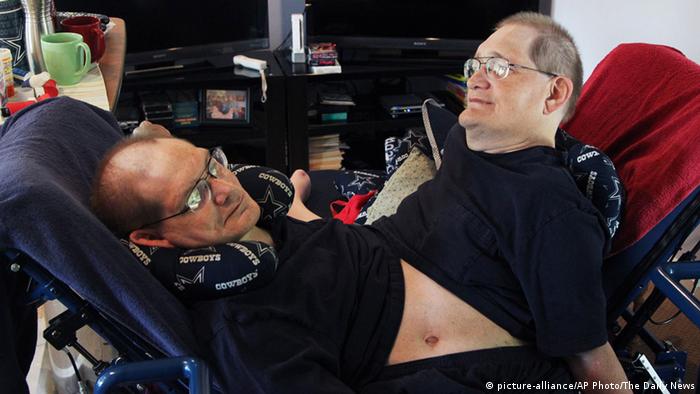
He however noted they had done everything possible to find the extent to which the twins were joined. "Immediately they arrived, we realized they were in fairly good condition, apart from some superficial infections," Ndomba Paul said.
"We took them to the x-ray department and we carried out a total body scan of each baby so as to appreciate especially the area of the thorax and the abdomen to see exactly the level of attachment of each one to the other," the pediatrician said.
The conjoined twins have reignited a debate on revamping social insurance in Cameroon. Currently only 10 percent of all public servants are covered. Many people are also now asking why the government apparently remains indifferent to those in need.
The NGO assisting the twins has opened an account at a bank in Yaounde for donations to help get the twins to the US.
Date 07.05.2015
Author Moki Kindzeka / cm
Source: Deutsche Welle
South African court grants man 'right to die'
- Details
- Category: Law & Justice
- Created on Friday, 01 May 2015 00:00
- Hits: 6655
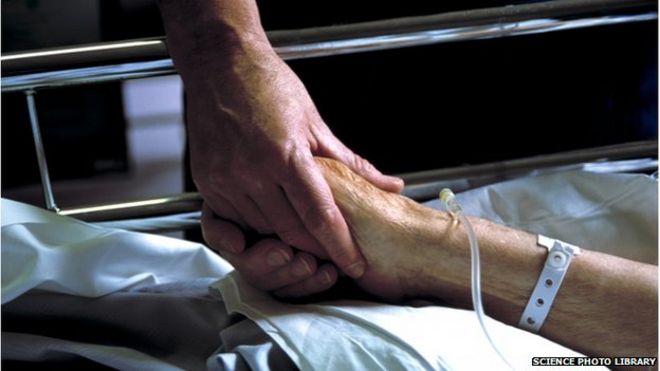 South African court grants man 'right to die'
South African court grants man 'right to die'
A South African court has granted a terminally ill man the right to die, in a landmark ruling for assisted suicide.
The Pretoria High Court ruled that Robin Stransham-Ford, 65, who was diagnosed with terminal prostate cancer in 2013, could allow a doctor to help him end his life.
Judge Hans Fabricius said that the doctor treating him could not now be prosecuted or face disciplinary action.
Campaign group Dignity SA says Mr Stransham-Ford later died.
He "died peacefully of natural causes", said Dignity SA, which helped Mr Stransham-Ford bring his case.
Before they learnt of his death, state prosecutors had said they would appeal against the ruling.
National Prosecuting Authority (NPA) spokesman Mthunzi Mhaga said the ruling was "precedent-setting" and had "far-reaching implications" from a health and constitutional point of view.
Judge Fabricius, quoted in local media, said the ruling applied only to Mr Stransham-Ford and that future cases would be debated on their merits.
"It is not correct to say from now on it will be a free-for-all," he is quoted as saying.
The justice and health ministers, as well as the Health Professions Council of South Africa, have opposed the legal case.
Dignity SA said it would welcome an appeal as a chance to test the right to die against the constitution, the Associated Press news agency reports.
Mr Stransham-Ford, a lawyer in Cape Town, had requested that the doctor who cares for him be protected from prosecution, losing his doctor's licence or being sued.
Source: BBC, 30 April 2015
Not in our name: World Press Freedom Day 116 days after Charlie Hebdo
- Details
- Category: DateLines
- Created on Monday, 04 May 2015 00:00
- Hits: 3657
 Not in our name: World Press Freedom Day 116 days after Charlie Hebdo
Not in our name: World Press Freedom Day 116 days after Charlie Hebdo
Full text of an open letter from media, writers and human rights associations worldwide calling for government action to protect freedom of speech
On World Press Freedom Day, 116 days after the attack at the office of the satirical newspaper Charlie Hebdo that left 11 dead and 12 wounded, we, the undersigned, reaffirm our commitment to defending the right to freedom of expression, even when that right is being used to express views that we and others may find difficult, or even offensive.
The Charlie Hebdo attack – a horrific reminder of the violence many journalists around the world face daily in the course of their work – provoked a series of worrying reactions across the globe.
In January, the office of the German daily Hamburger Morgenpost was firebombed following the paper’s publishing of several Charlie Hebdo images. In Turkey, journalists reported receiving death threats following their re-publishing of images taken from Charlie Hebdo. In February, a gunman apparently inspired by the attack in Paris, opened fire at a free expression event in Copenhagen; his target was a controversial Swedish cartoonist who had depicted the prophet Muhammad in his drawings.
But many of the most disturbing reactions – and the most serious threats to freedom of expression – have come from governments.
A Turkish court blocked web pages that had carried images of Charlie Hebdo’s front cover; Russia’s communications watchdog warned six media outlets that publishing religious-themed cartoons “could be viewed as a violation of the laws on mass media and extremism”; Egypt’s president Abdel Fatah al-Sisi empowered the prime minister to ban any foreign publication deemed offensive to religion; the editor of the Kenyan newspaper The Star was summoned by the government’s media council, asked to explain his “unprofessional conduct” in publishing images of Charlie Hebdo, and his newspaper had to issue a public apology; Senegal banned Charlie Hebdo and other publications that re-printed its images; in India, Mumbai police used laws covering threats to public order and offensive content to block access to websites carrying Charlie Hebdo images. This list is far from exhaustive.
Perhaps the most long-reaching threats to freedom of expression have come from governments ostensibly motivated by security concerns. Following the attack on Charlie Hebdo, 11 interior ministers from European Union countries, including France, Britain and Germany, issued a statement in which they called on internet service providers to identify and remove online content “that aims to incite hatred and terror”. In the UK, despite the already gross intrusion of the British intelligence services into private data, Prime Minister David Cameron suggested that the country should go a step further and ban internet services that did not give the government the ability to monitor all encrypted chats and calls.
This kind of governmental response is chilling because a particularly insidious threat to our right to free expression is self-censorship. In order to fully exercise the right to freedom of expression, individuals must be able to communicate without fear of intrusion by the state. Under international law, the right to freedom of expression also protects speech that some may find shocking, offensive or disturbing. Importantly, the right to freedom of expression means that those who feel offended also have the right to challenge others through free debate and open discussion, or through peaceful protest.
On World Press Freedom Day, we, the undersigned, call on all governments to:
- Uphold their international obligations to protect the rights of freedom of expression and information for all, especially journalists, writers, artists and human rights defenders to publish, write and speak freely;
- Promote a safe and enabling environment for those who exercise their right to freedom of expression, especially for journalists, artists and human rights defenders to perform their work without interference;
- Combat impunity for threats and violations aimed at journalists and others threatened for exercising their right to freedom of expression and ensure impartial, speedy, thorough, independent and effective investigations that bring masterminds behind attacks on journalists to justice, and ensure victims and their families have speedy access to appropriate remedies;
- Repeal legislation which restricts the right to legitimate freedom of expression, especially such as vague and overbroad national security, sedition, blasphemy and criminal defamation laws and other legislation used to imprison, harass and silence journalists and others exercising free expression;
- Promote voluntary self-regulation mechanisms, completely independent of governments, for print media;
- Ensure that the respect of human rights is at the heart of communication surveillance policy. Laws and legal standards governing communication surveillance must therefore be updated, strengthened and brought under legislative and judicial control. Any interference can only be justified if it is clearly defined by law, pursues a legitimate aim and is strictly necessary to the aim pursued.
PEN International
Adil Soz - International Foundation for Protection of Freedom of Speech
Africa Freedom of Information Centre
Albanian Media Institute
Article 19
Association of European Journalists
Bahrain Center for Human Rights
Belarusian PEN
Brazilian Association for Investigative Journalism
Cambodian Center for Human Rights
Canadian Journalists for Free Expression
Center for Media Freedom and Responsibility
Centre for Independent Journalism – Malaysia
Committee to Protect Journalists
Danish PEN
Derechos Digitales
Egyptian Organization for Human Rights
English PEN
Ethical Journalism Network
Finnish PEN
Foro de Periodismo Argentino
Fundamedios - Andean Foundation for Media Observation and Study
Globe International Center
Guardian News Media Limited
Icelandic PEN
Index on Censorship
Institute for the Studies on Free Flow of Information
International Federation of Journalists
International Press Institute
International Publishers Association
Malawi PEN
Media, Entertainment and Arts Alliance
Media Institute of Southern Africa
Media Legal Defence Initiative
Media Rights Agenda
Media Watch
Mexico PEN
Norwegian PEN
Observatorio Latinoamericano para la Libertad de Expresión – OLA
Open Rights Group
Pacific Islands News Association
PEN Afrikaans
PEN American Center
PEN Canada
PEN Catalan
PEN Lithuania
PEN Quebec
Peruvian PEN
Russian PEN
San Miguel Allende PEN
PEN South Africa
Southeast Asian Press Alliance
Swedish PEN
Turkish PEN
Wales PEN Cymru
West African Journalists Association
World Press Freedom Committee
Source: The Guardian UK
'Investigate UN peacekeepers for sexual crimes'
- Details
- Category: DateLines
- Created on Friday, 01 May 2015 00:00
- Hits: 7076
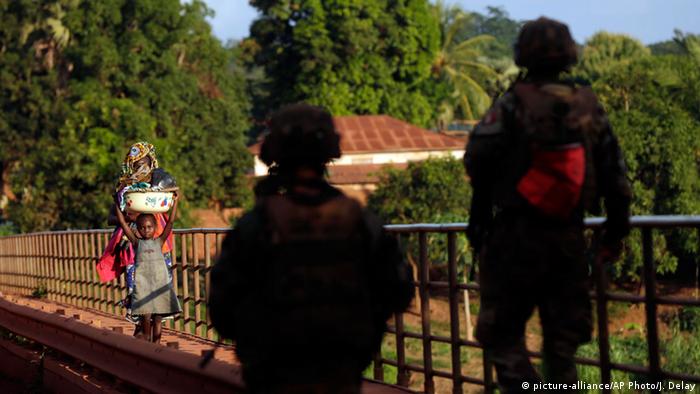 'Investigate UN peacekeepers for sexual crimes'
'Investigate UN peacekeepers for sexual crimes'
A UN report has revealed that 14 French peacekeepers are suspected of sexually abusing children in Central African Republic (CAR). DW spoke to AIDS-Free World's Paula Donovan, who leaked the report.
The report was leaked by a senior UN official and given to British newspaper The Guardian by Paula Donovan, co-director of the organization AIDS-Free World. French President Francois Hollande has promised tough punishment for any soldier found guilty of sexual abuse and a defense ministry spokesman said efforts were being made to verify the truth of the accusations. DW spoke to Paula Donovan.
DW: These abuses allegedly took place around refugee camps inside CAR in 2013 and 2014. Can you tell us more about what is alleged to have happened?
Paula Donovan: It seems as though roughly 10 to 12 children are known to the UN as having been victims of sexual abuse by a variety of different French soldiers. Six of those children were interviewed directly by the UN, UNICEF and the Commission for Human Rights officers on the ground. The interviews took place in May and towards the end of June and the interviewers asked questions which the children answered about the abuses that they had themselves suffered or had witnessed. In most cases it was soldiers asking or demanding that if children wanted some small food rations or a little bit of water or cash, they would have to perform oral sex on the soldiers. The soldiers seemed to have been extracting these sexual abuses out of the children independently or in teams. It's not like a pedophile ring or anything along those lines. Soldiers at random seemed to have decided that they could exploit and sexually abuse various kids in different states of distress. Some of these children were homeless, hungry and desperate. Others had been either separated from their families or even lost their parents during the conflict in early December 2013. So it's quite an ugly scene.
Usually when we hear of rape in conflict areas, we think of the victims being women and girls. It seems that most of the children abused in this case were boys. Were girls not affected in this specific case?
All the children interviewed were boys and all the children mentioned by those interviewees were boys.
The whistleblower, a senior UN official, was suspended from his position at the UN for leaking this document to French authorities. What does this say about the UN's willingness to actually tackle this problem and bring it out into the open?
I don't know why there is such a focus on the person who gave this document to the French prosecutors. I haven't spoken to him or had any contact with him. But from the way I have heard this described, I don't think that this is a case of leaking. I think this is a case of delivering a document without going through the proper protocol channels according to the UN. With such a horrendous situation on the ground in CAR, and so much misconduct at the very top levels of the United Nations doing damage control and just trying to manipulate things for political purposes to prevent the UN's reputation from being damaged, but with so much awful stuff happening to children and so many perpetrators of grotesque crimes at large, I will never understand this singular focus on one man who took a document that was going to end up in the hands of French authorities eventually anyway, and brought it directly to the French himself. To consider that the high crime among all these vicious, violent and disgusting crimes, makes absolutely no logical or ethical sense to me.
What in your eyes should be the next step in addressing this case?
I believe that all appropriate authorities with any wherewithal should conduct criminal investigations and ensure that as many children who were affected by these abuses or may still be affected by these abuses in CAR who can possibly be located, are located and assisted. That should happen immediately. It should be all hands on deck with the victims as the very first concern of everyone - from member states, from the French to other member states and to all branches of the United Nations that could be appropriately involved. That's one thing. And on a parallel level, I think that the handling of this case and the tremendous numbers of sexual exploitations and abuse allegations throughout the world in peacekeeping operations are so miserably dealt with by the United Nations, they never ever seem to come to light unless the media gets involved and then suddenly there's a scramble to do the right thing or to control the damage. I think this needs a full commission of inquiry, completely independent of the UN, that will look into every aspect of sexual exploitation and abuse by both military and civilian peacekeeping personnel and all the headquarters and other staff who are supervising and running peacekeeping missions around the world. This all needs to be thoroughly investigated and looked into by an independent commission that member states should be calling for.
Paula Donovan is the co-director of AIDS-Free World
Interview: Isaac Mugabi
Date 30.04.2015
Author Isaac Mugabi
Source: Deutsche Welle


